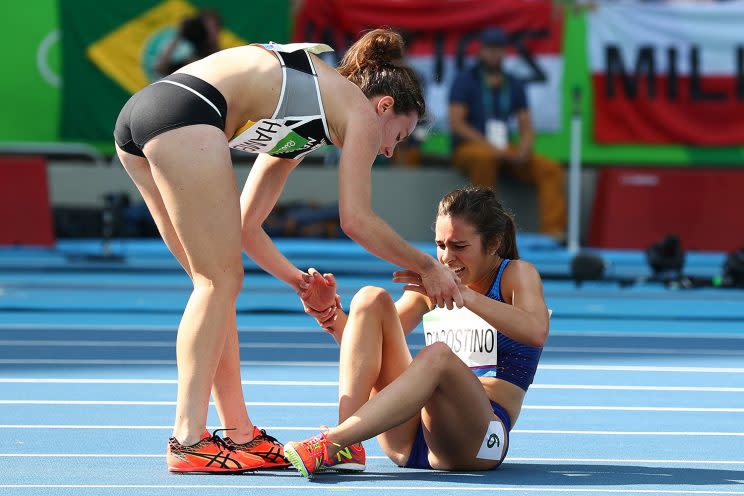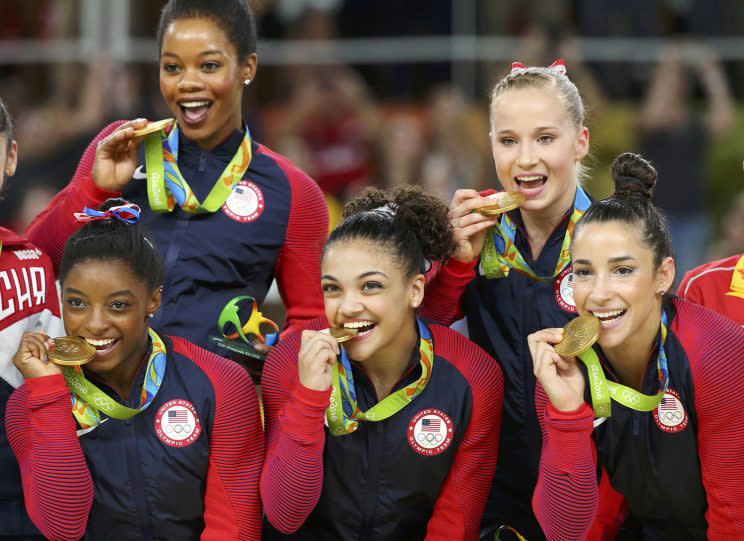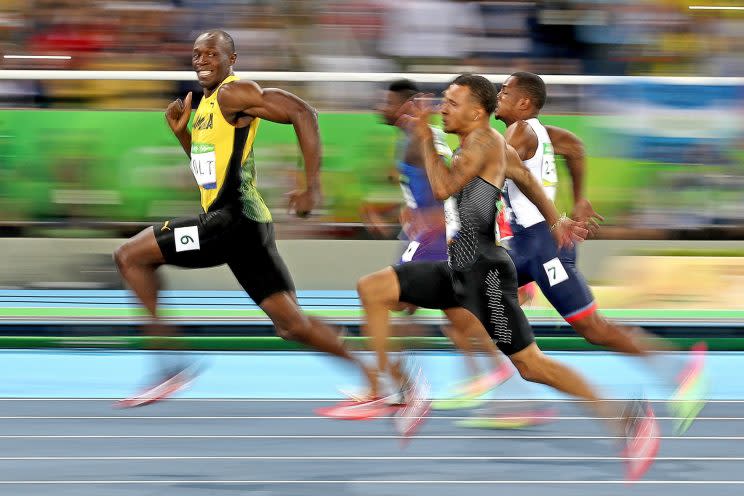The top 10 stories of the 2016 Rio Olympics
Medal count | Olympic schedule | Olympic news
After 17 days of action, we’ve finally come to the end of another Olympics. No one got Zika (as far as we know), the biggest stickup was one that didn’t happen and the unnecessary lifeguards at the swimming pool didn’t have to have to jump in and save anyone.
So as the sporting world turns its eyes toward toward the 2018 Winter Games in Pyeongchang, South Korea – only about 535 days away, folks – what are the lasting images and stories we’ll remember from Rio?
With all due respect to the shirtless Tongan flagbearer and the stripping Mongolian wrestling coaches, among all the other strange stories out of Rio these past two weeks, here are our picks, with an obvious preference toward American achievement.
10. Jordan Burroughs’ shocking upset: The Newark product came to Brazil sporting a 130-2 record in international competition and was considered a heavy favorite to defend the gold medal he won at the London Games. It didn’t happen, though. Burroughs suffered two upsets and didn’t medal at all. But while anyone can have a bad day, not everyone can respond like Burroughs did. His post-match press conference was among the most raw and honest you’ll ever see from a defeated athlete.
9. Kerri Walsh Jennings’ Olympic dominance comes to an end: Death, taxes and Kerri Walsh Jennings winning gold at the Olympics, right? Not this year. The American beach volleyball star and three-time gold medalist lost for the first time in 26 Olympic matches, falling in the semifinals with new partner April Ross. After ridding herself of the unfamiliar taste of defeat, Walsh Jennings rebounded to win bronze at the volleyball venue on Copacabana Beach. Walsh Jennings is 38 and says she’s not sure what’s next.
8. Allyson Felix becomes most decorated woman in U.S. track and field history: She’s 30 years old and Felix says it’s possible she’ll make a run at the Tokyo Games in 2020. But if this was it for the native Los Angeleno, she’ll still have a haul of medals to carry around for the rest of her life. Felix won three medals – golds in the 4×100 and 4×400 relays and a silver in the 400 meters – to bring her career total to nine. That’s tied for the most of any woman in Olympic track and field history and puts her just behind Finland’s Paavo Nurmi (12) and the United States’ Carl Lewis (10) for the most medals of any track and field athlete. Her six golds are the second-most for any American woman athlete (Jenny Thompson won a total of eight in the pool).
7. Simone Manuel’s barrier-breaking swim: She might not have been the most famous Simone coming into the Games (take a bow, Biles), but swimmer Simone Manuel made sure her name was known by the time she left Brazil. The Stanford student’s gold medal in the 100-meter freestyle was the first for a female African-American swimmer and she ended up taking home a total of four medals. No wonder everyone started talking about naming their future baby girls Simone.
6. The Dream Teams cruise to gold: The international competition for the United States’ men’s and women’s basketball teams was so weak that we spent a good deal of time debating who’d win a 1-on-1 matchup between Brittany Griner and DeMarcus Cousins. Neither team suffered a defeat as the women won their sixth-straight gold medal and the men triumphed despite the notable absences of LeBron James and Steph Curry. The rest of the world will have four more years to up their games, but we somehow don’t think that will help unless part of the team gets lost in a brothel again.

5. Abbey D’Agostino, Nikki Hamblin and the true Olympic spirit: It’s written in the International Olympic Committee charter that every Games must be marked by at least one feel-good moment that assures the rest of us that humankind is inherently good and the planet isn’t minutes from spinning off its axis and into the fires of hell. (At least we’re pretty sure that’s written in there.)
For these Olympics, that moment came when Abbey D’Agostino of the United States and Nikki Hamblin of New Zealand collided in a 5,000-meter qualifying race. Both women helped each other up and D’Agostino hobbled her way to the end of the race despite a knee that had been shredded so thoroughly she’d need surgery. Both women received an Olympic medal for their efforts. Despite the snark above, it really was an awesome moment, the type you immediately wanted to share on Facebook to assure all of your friends that, yes, it’s all going to be OK.
4. Ryan Lochte and Hope Solo play the Ugly American: The United States won so much at these games – 121 total medals to be precise, 51 more than second-place China – that the rest of the world didn’t need much of a reason to dislike us. But oh boy did noted American brain surgeons Ryan Lochte and Hope Solo give them a couple of reasons anyway.
Solo drove the Olympics’ first week of internet outrage by calling the Swedish team “cowards” after it tightened the vise on the U.S. women’s national soccer team and upset the 2015 World Cup champions in the Olympic quarterfinals. And Lochte? Well, do we really need to run down the actions of that balloonhead? It’s possible the 2016 Rio Games will be known forever as the “Lochte Games,” but we prefer to think the tabloidesque ubiquity the Lochte farce enjoyed this past week will soon fade and we’ll instead remember these Olympics for the final three items on this list, starting with …

3. Simone Biles and the Final Five make history: To the victors go the cereal boxes. Simone Biles came to Brazil shouldering expectations that left almost no room for error and left with one of the most dominating performances in Olympic history and a dream meetup with Zac Efron. Biles trounced the competition in the individual all-around, part of a Rio stay that saw her take home four golds and one bronze medal. (“Michael Phelps taught me how to stack my medals,” she humblebragged on Sunday.)
As part of the “Final Five,” Biles won gold with a talented collection of teammates that were great in their own right. Biles, Aly Raisman, Laurie Hernandez, Gabby Douglas and Madison Kocian successfully defended the team title the U.S. won in 2012 and took home a U.S. record-breaking haul of nine medals. The biggest question between now and Tokyo is whether the 19-year-old Biles can stay at this level and erase any doubt she’s the best gymnast of all time.
2. Michael Phelps, Katie Ledecky and the U.S. dominate the pool: Phelps wrote the ending that he wanted for his career, putting together a trip that saw the Olympic titan win five gold medals and a silver to bring his career total to 28 medals, 23 of them gold. (It was said wearing all 23 would be hazardous to his health.) Phelps’ swan song – no, really, he insists this is it – didn’t take place in an empty cupboard, though. The United States swimming team dominated the swimming venue, winning 33 medals (16 gold, eight silver, nine bronze) for its best finish since the 2000 Sydney Games. It even has its future icon in place as 19-year-old Katie Ledecky demolished all comers in a sweep of the 200-, 400- and 800-meter freestyle events. With five career gold medals, expect her to be the face of the American team as it heads into the 2020 Olympics in Tokyo.

1. Usain Bolt dominates the spotlight once again: Picking between Phelps and Bolt as the Olympics’ biggest story is about as thankless of a task as a Rio shuttle bus driver has. But we’re going with Bolt because he once again proved that his appeal transcends international borders in an event where interest is fueled almost exclusively by unabashed nationalism. (Seriously, just look at this list.) People from every nation cheered as Bolt dominated the 100 meters, 200 meters and 4×100-meter relay for the third-straight Olympics, spreading joy and looking impossibly cool while doing so. The Olympics can and will go on without Bolt and Phelps in 2020, but there’s no denying it will feel like a lesser event without the both of them.

 Yahoo Sports
Yahoo Sports 


